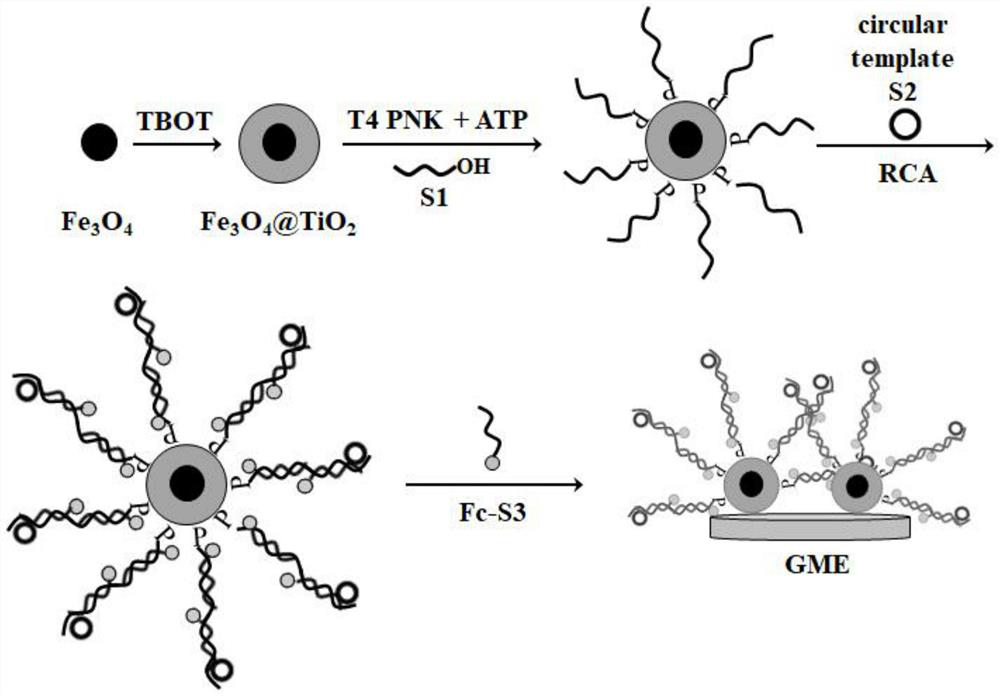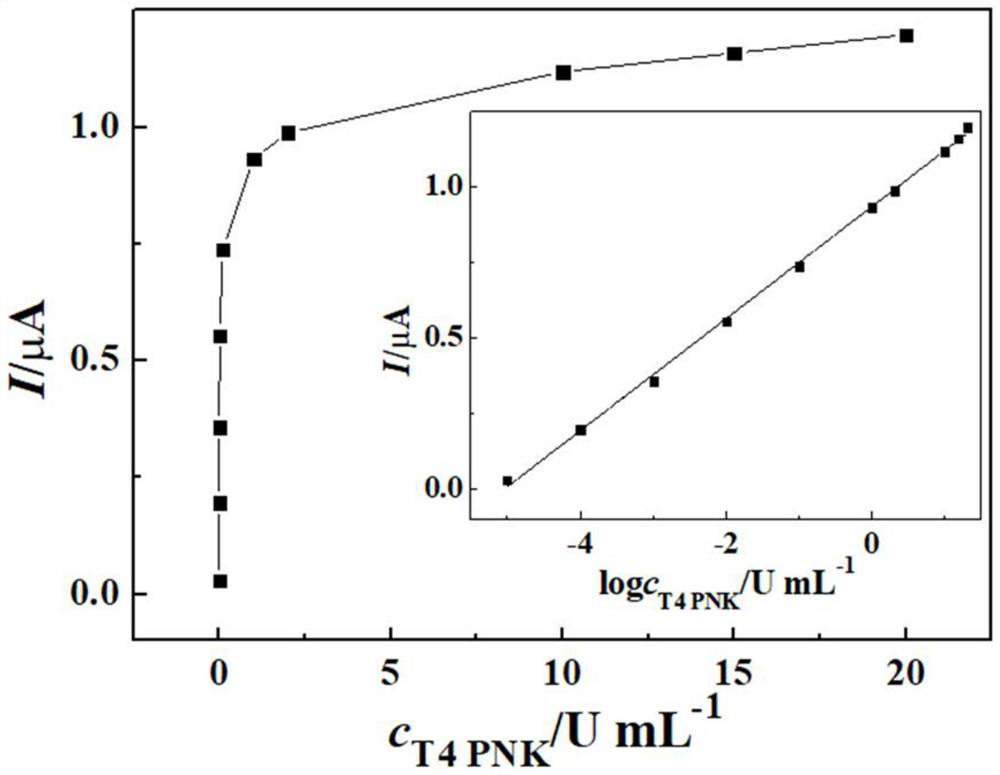Method for measuring T4 polynucleotide kinase activity based on magnetic nanomaterials and biological signal amplification technology
A polynucleotide and magnetic nanotechnology, applied in the field of biochemical analysis, can solve the problems of application limitation, cumbersome operation process and high cost, and achieve the effect of improving selectivity and specificity
- Summary
- Abstract
- Description
- Claims
- Application Information
AI Technical Summary
Problems solved by technology
Method used
Image
Examples
Embodiment 1
[0039] The present invention is based on Fe 3 o 4 @TiO 2 The principle of the method for detecting T4PNK activity by dual signal amplification technology of magnetic core-shell nanoparticles and biological signals is as follows: figure 1 shown. First prepare the Fe 3 o 4 @TiO 2 In the presence of magnetic core-shell nanoparticles, ATP and T4 PNK, the 5′ end of the primer strand S1 in the rolling circle amplification reaction was phosphorylated, and the phosphorylated primer strand S1 passed through the reaction with TiO 2 Specific reaction, modified to Fe 3 o 4 @TiO 2 Magnetic nanoparticle surfaces. Join Ring Template S 2 , in the presence of T4 DNA ligase, S2 and Fe 3 o 4 @TiO 2 The S1 hybridization of the primer strand on the surface of the magnetic nanoparticle forms a circular mixture. In the presence of phi29 DNA polymerase and dNTPs, Fe 3 o 4 @TiO 2 RCA reaction occurs on the surface of magnetic nanoparticles. Ferrocene-labeled nucleic acid chain S3 (Fc...
Embodiment 2
[0041] Oligonucleotide sequence design
[0042] The oligonucleotide sequence designed in the present invention was synthesized by China Shanghai Sangon Bioengineering Co., Ltd., purified and tested by HPLC, and freeze-dried. The oligonucleotide sequence designed by the present invention is as follows:
[0043] S1: 5'-TTTTTTCACAGAGGATAGGACATGA-3';
[0044] S2: 5′-PO 4 - CTCAGCTGTGAACAACTAGAAGATAACTGTGAAGATCGCTTATCATGTCCTATC-3';
[0045] S3: 5′-NH 2 -TTTTTTTTTAAGATAACTGTGATTTTTTTT-NH 2 -3';
[0046] The oligonucleotides were dissolved in ultrapure sterile water and stored at -18°C for later use.
Embodiment 3
[0048] Fe 3 o 4 @TiO 2 Preparation of Magnetic Core-Shell Nanoparticles
[0049] Weigh 0.615g FeCl 3 ·6H 2 Dissolve O in 20 mL of ethylene glycol, add 1.8 g of NaAc and 0.5 g of polyethylene glycol, stir the solution, transfer it to a 100 mL Teflon-lined stainless steel autoclave, react at 200 °C for 8 hours, and cool to room temperature , washed several times with ethanol, separated by magnetic force, and air-dried at room temperature to obtain Fe 3 o 4 magnetic nanoparticles. Take 9.6mL glacial acetic acid and 6.8mL butyl titanate and dissolve in 60mL ethanol, add 0.4g Fe 3 o 4 Magnetic nanoparticles were ultrasonically dispersed for 15 min, 2.4 g of polyethylene glycol and 3.6 g of urea were added, stirred electrically for 1 h, and then the mixture was transferred to a reaction vessel for crystallization at 180° C. for 8 h. After cooling to room temperature, the precipitate was filtered and washed several times with ethanol, and dried at 80 °C for 12 h to give Fe ...
PUM
| Property | Measurement | Unit |
|---|---|---|
| diameter | aaaaa | aaaaa |
| diameter | aaaaa | aaaaa |
Abstract
Description
Claims
Application Information
 Login to View More
Login to View More - R&D
- Intellectual Property
- Life Sciences
- Materials
- Tech Scout
- Unparalleled Data Quality
- Higher Quality Content
- 60% Fewer Hallucinations
Browse by: Latest US Patents, China's latest patents, Technical Efficacy Thesaurus, Application Domain, Technology Topic, Popular Technical Reports.
© 2025 PatSnap. All rights reserved.Legal|Privacy policy|Modern Slavery Act Transparency Statement|Sitemap|About US| Contact US: help@patsnap.com


